With more than €300m invested and over 40 companies funded, Middlegame Ventures launched its first fund in January 2020 and now has offices in Luxembourg, Dublin, London and Washington. It has two active funds (both Luxembourg entities) and a global staff of eight.
The firm invests in early-stage startups in the fintech sphere. Managing partner and co-founder Pascal Bouvier told us more in an interview.
Delano: Tell us about Middlegame Ventures.
Pascal Bouvier: MiddleGame Ventures is a venture firm that invests in early stage fintech startups. The firm is led by partners who have collectively over 30 years of experience in investing, and over 30 years of experience in operating businesses, be it in technology startups or established financial firms. MiddleGame Ventures is based out of Luxembourg as of the inception of its first fund in January 2020. It is currently raising its third fintech fund.
How did the firm get started?
Michael Meyer and [I] met in 1990 and have managed and grown various businesses together along the years. They started on their fintech journey in early 2010s. They finally decided to launch their very own venture firm after having built and managed several others for third parties. They were later joined by Patrick Pinschmidt and the first fund was launched and became operational in January 2020. In a way, we all have lived several lives, one in the traditional financial services sector, one as entrepreneurs and one as investors in other asset classes. All these past lives got intertwined and ultimately forged our interest and journey in venture capital.
What are you looking for in a portfolio company?
First and foremost we look for exceptional talent. The business of investing in early-stage startups is a hard one, fraught with unknowns. The best way to mitigate these unknowns is to invest in founders, in entrepreneurs who exhibit exceptional abilities for making the right decision in a time-pressure environment. So we look for those individuals that have edge control (ability to make the right decision under stress), that will make things happen no matter what, that have a can-do attitude against all odds, that have subject matter expertise relevant to the startup they have created, that have an open mind and are problem solvers.
As for the business models we seek B2B or B2B2C models where novel technologies are applied and customised which will solve for major points of friction in any given value proposition in the financial services industry, be it in payments, insurance, lending, capital markets or asset management. We look for startups that are addressing large markets and where the incumbent solutions yield inefficiencies for all that use them.
What is your top challenge, as a VC firm, this year? Your top opportunity?
Our top challenge is to keep abreast of all the technology advances in our fields. The rate of change has exploded in the last 15 years and continues unabated. We have cloud computing, APIs, advanced analytics, machine learning, AI, generative AI, blockchain, smart contracts, intelligent robotic automation. The rate of change in the regulatory and legislative world is also quite high in the financial services industry and we have to continue to learn and understand the implications of GDPR, PSD2, MiCA, MiFID, DAC8 as well as other lesser-known regulations, laws and their subsequent versions. These top challenges are also our top opportunities. By applying the right data analytics, and using the right tools and cultivating the right networks to yield the right signal, we are able to find the right startups to invest in.
What do you want the general public to know about the venture capital industry?
For those who want to join a venture fund, it is a wonderful career. My advice is to work with one or two startups and be knowledgeable about a few foundational technologies before trying to get hired by a VC firm. For those who want to seek exposure to alternative assets for financial planning purposes, I can only recommend venture, as the returns are quite attractive over long periods of time--indeed our new connected economies are in need of all kinds of digital solutions on a permanent basis. For those that are just curious and want to know more, you need to understand ours is a profession that is still relationship-based, where constant learning is the key, and cultivating one’s network in eclectic ways as well as understanding what motivates people (other investors, entrepreneurs) is key to success.
Three current portfolio companies to highlight?
—Keyrock: market maker in digital assets, based out of Brussels, Belgium. One of our star performers. Keyrock is developing a library of algorithms to make markets and bid/ask/spread for a variety of digital assets across over 80 trading venues and in OTC trading.
—Minna Technologies: subscription management of digital services sold to retail banks and for the benefit of their clients. Minna is Sweden-based, out of Gothenburg. Minna has developed a subscription management service that, off of your banking checking account, allows you to unsubscribe, subscribe and change the subscription to all of your digital services such as Amazon Prime, Netflix, any news media, utilities accounts…
—Circit: Dublin-based Circit has developed a fully automated process to manage, end to end, the life of a letter of confirmation for a specific asset or specific transaction. Auditors currently manage this process, when auditing firms, in an almost completely manual way. Circit is revolutionising this market and intends to allow any legal entity to automatically prove the veracity of a given transaction or a given asset.
Any exits to mention?
We have only one exit out of our two funds (these funds are still young). We invested in Capdesk, a cap table management software provider that allows any legal entity to manage, in the cloud, all its shareholders, bond holders, categories of shares or types of bonds. Capdesk was acquired by Carta (a US startup) at the end of 2022.
